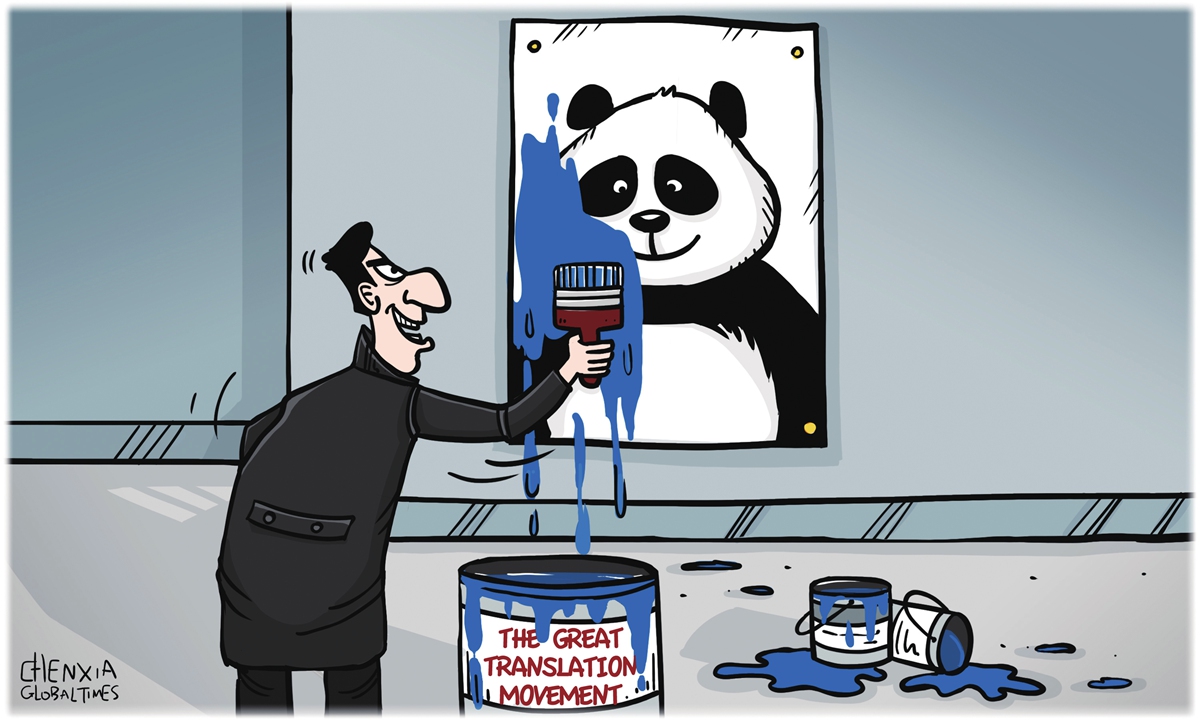
The Great Translation Movement Illustration: Chen Xia/GT
A so-called Great Translation Movement has recently gained extensive attention online. It selectively chose messages and extreme comments posted by Chinese netizens and translates them into various languages, aiming to expose the "ugly sides" of China and its people.
In the West, there was a time when witch hunts prevailed. Senator Joseph McCarthy led the communist witch hunts in the 1950s. The movement targeted some groups of people specifically, labeled them as bad, and then attacked them. Now the "Great Translation Movement" is using the same strategy.
Translation is supposed to be a bridge for communication, but the "Great Translation Movement" is using it in a distorted and purposeful way. The participants of this co-called movement are those unfriendly or even hostile toward China with the simple purpose of creating more waves of anti-China sentiment. And by magnifying some marginal, extreme viewpoints of the Chinese netizens, these people attempt to solidify other nations' biased perceptions of China.
When China and the US were enjoying their honeymoon period at the early stage of bilateral engagement, the image of the Chinese government and the Chinese people was rather positive in the West. But as the West is taking a more and more adversarial attitude toward China, the former failed to shed its perception toward a communist government under the influence of the Cold War.
In this so-called Great Translation Movement, we can see these forces have adopted a strategy of dividing the Chinese people into "non-mainlanders" and "mainlanders." Those people want to create a perception that the Chinese people are good in nature, but those on the Chinese mainland have become evil due to the communist government's "constant brainwashing." The "movement" is, therefore, against the Chinese government rather than the Chinese people as a whole.
Such a despicable "movement" has a large potential audience, mostly in the West. Some of them are novelty-seeking and feel superior on a cultural level. In light of China's rapid rise and the West's decline, these people need an illusional superiority to feel better. It is suggested, through the "Great Translation Movement," that the "Chinese government is incapable, and that the Chinese people under its leadership are selfish, despicable, and shameless." This is meant to cater to Western discourse toward China.
If the deliberately selected comments in the "Great Translation Movement" can represent the mainstream in China, how about the mainstream voice in the West, particularly the US? After all, opinions in the West are completely polarized with extremes. A politician can clamor for the assassination of another country's president, and can incite hatred between countries and peoples. In China, politicians would not make such reckless remarks. Selecting marginalized views and magnifying them as the mainstream views of Chinese society is part of a despicable smear campaign.
The "Great Translation Movement" is a part of the public opinion and psychological warfare against China. It will certainly discredit China's image outside the country and even change how the Chinese people are treated in the world, be they the Chinese diaspora or "mainlanders."
The "Great Translation Movement" won't end soon. As the strategic competition between China and the West continues, the fight will only become fiercer. At the same time, under the rising anti-China sentiment in the West, some forces will take the opportunity to use more eye-catching gimmicks to report China, gaining political and economic benefits.
Psychologically, we need to be prepared for a long-term struggle. Meanwhile, we need to strengthen our weapons in this struggle. Behind the "Great Translation Movement," are some Chinese citizens that vent their frustration online, and some foreign hostile forces that hide their true identity to deliberately spread hatred against China and its people. In the face of that, we need to strengthen the management of the internet by legal regulations. Through measures such as real-name registration and IP tracking, we can unmask who's really behind these forces.
And with the continuous evolution of technology, there will be new tools for public opinion and psychological warfare against China, including artificial intelligence and the metaverse. What is more frightening is that in a more virtual world, it will be even more difficult to tell what's real and fake; so will be the struggle.
To deal with the possible new challenges, we need to keep focusing on the development of technologies. In addition, we can also strengthen the buildup of the public opinion platforms that we take control of. Cooperating with other developing countries and striving for their power will also be beneficial.
The author is a military observer. opinion@globaltimes.com.cn




